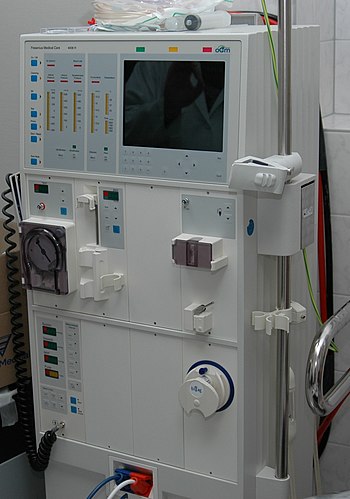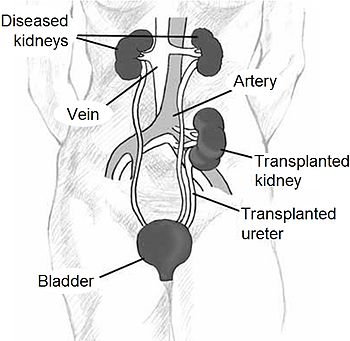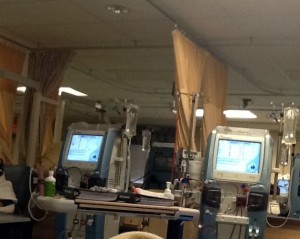Posts Tagged ‘St. Michael’s Hospital’
-
My Hospital Go Bag

I’ve been unfortunate to be an in-patient twice in 2024 at RVH – my local hospital. And I’m at the top of the kidney transplant list. So I created a hospital go-bag that I can just grab when the call comes or in the unfortunate circumstance that I have to call 9-1-1. Please note this post does contain affiliate links.
So what’s in it?
The bag itself is a black bag with silver handles not dissimilar to this one.
- A change of underwear for a week.
- Toiletries including tooth brush/tooth paste. (I use the one my dentist gives me but you can buy small ones at Dollar Tree.) The bag itself is a pencil case I bought at Dollar Tree that fits everything.
- Nail clipper.
- A hallowe’en sized bag of Skittles with smaller bags in it. Please note I am not diabetic.
- A list of my medications.
- A “No Needles/No BP” bracelet. As a dialysis patient, this is important.
- A bottle of lotion.
- Headphones from the dollar store. Just like at dialysis, it never hurts to be polite to your roomate(s).
- Back up charging cable & USB/USB C plug.
- Adult colouring book from Dollarama
- Coloured pencil’s from Walmart
- A box of scotties facial tissues. (The hospital ones are the pits IMHO.)
- A blanket from home.
- A light bath robe. Not all units have those hospital robes.
- A notebook & pen to write down questions and answers when talking to doctors.
- A good pair of slippers.
- A lux bar of soap from The Rocky Mountain Soap Company. The holder I got from Dollar Tree.
- Lip balm.
- Organizer for my charging cables.
- A book light. Not because I want to read but because it’s a light I guarantee I can control from bed.
Where did I get everything?
- My own house – I already had it
- Temu
- Dollar Tree
- Amazon
- Walmart
- Rocky Mountain Soap Company
- Dollarama
-
A Veteran’s Take on being a Renal Patient: Ten Things I have Learned
So this article is a response/extension of an article I read earlier today.
A Rookie’s Take on Dialysis: Ten Things I Have Learned So Far.I have been a renal patient since 1985. I have been on peritoneal dialysis twice, and hemodialysis once. In addition, I have had three renal transplants.
1. You’ll wait on the transplant list for what seems like forever.
It takes a good year just to get on the transplant list due to all the testing, and vetting the doctor’s and hospital’s like to do.
WARNING: Once you’re on the list, don’t change transplant centre’s or you’ll have to start over from scratch!
In 2008 I moved from Ottawa, to Barrie. I got set up with St. Michael’s Hospital in Toronto. It took me 2 years to get on the transplant list with St. Mike’s.
2. The medical staff is not your friend.
Yes it may seem like it is one big happy family. Our unit has an annual Christmas party. It’s fun (if you choose to attend,) and probably worth attending once or twice. But you have to remember the staff aren’t your friend. They are there to get paid. So if you think something is wrong, or needs investigating, etc. it’s on YOU to inform the staff. And stick to your guns. It beats having to go to the ER when something does happen.
The staff like you to believe you can live a normal life. So believe it, and follow through on it. If you need a shift change, demand it. I’ve missed dialysis a few times over the years because a change wasn’t possible. Call their bluff. Now I know what I have to do to get that change.
3. Dialysis > Death
That is such bullshit! Ok, so I’m alive.
That isn’t always better to how you feel while a dialysis patient. With the amount of dialysis we get, you don’t feel like you did when you had fully functioning kidneys.
Back to #2 – You have a right to live your life, otherwise why are you on dialysis in the first place?
4. Warm blankets are one of the best things in the world.
Warm blankets are better than hot, fresh pizza! But you should always bring a blanket just in case your unit runs out of warm blankets, or even worse, doesn’t have any to begin with. (Like at Soldier’s Memorial Hospital in Orillia.)
5. Stand up for yourself.
This definitely goes back to some of what I’ve already written here.
When you’re admitted to the hospital for whatever reason (line insertion, transplant, fistula, line infection, clot, etc.) stand up for yourself. The last time I was admitted, I didn’t get my admission papers until the day before I was released. So demand them.
Don’t like the food? Demand better.
Write a letter/email to the CEO. Talk to the nurse or patient rep. (Many hospitals now have patient rep’s to see to your care and needs. Talk to them!) Or what I did; I knocked on the unit manager’s door, and let myself in. I got what I needed in a New York minute.
6. Relax.
This seems to contradict everything else I’ve written so far. However, if you don’t relax your blood pressure, and heart rate will go up. You won’t be doing yourself any favours. So when you have time, relax. I try to relax while on dialysis, but seeing as how my blood is passing through me at a fast rate, not always the best time.
7. A transplant doesn’t last forever.
A transplant doesn’t last forever. The current estimate (and I’m not a doctor,) is 20 years for a full life of a transplant, and 10 for a half life. Most recipients will be back on dialysis after about the 10 year mark.
There are many recipients who are exceptions to this.
8. Dialysis is not a mental game.
See #6. If you psych yourself out over going to dialysis, then you’ll just cause your blood pressure to rise, and your heart rate to rise. Think of it as an opportunity to be away from the kids, or co-workers, etc for a few hours. It’s ‘you’ time.
9. Drugs.
Weather you’re on dialysis, or have a transplant – there are so many fracking drugs! So make sure to discuss them all with your pharmacist. In Ontario, you can go for a MedsCheck review once a year. It’s paid for by OHIP. Go over your meds, check there aren’t any that have been discontinued, that the pharmacy has the right dosages, etc.
Before any transplant, the social worker at your transplant centre will meet with you and ensure you have proper insurance coverage to pay for them. If not, the social worker will help you there too.
Many of the drug companies now have programs that if you loose coverage, they’ll provide your drugs for free. So be sure to ask about that, and to enroll!
10. Everything else.
- Keep an eye on your ‘dialysis adequacy‘. It’s a measure to determine if you’re getting enough dialysis or not. My unit checks mine every month. But they may not tell you what it is. So ask! You might be able to reduce the amount of time you spend there.
- Your creatinine level will never be the same again. Not even with a transplant. It’ll be close once you have a transplant, but will never be what it was when you were perfectly healthy.
- If your unit offers coffee/tea/other drinks, it’s a good idea to bring your own mug! (You save the environment, and get more than fits in a tiny styrofoam cup.)
- Be nice to the staff. They can make your life very difficult. You should stand up for yourself, but do it in a polite way.
-
Healthcare industry injustice towards vegetarians & vegans
Over the last 6 months, a lot has gone on in my life. As my close friends know, I lost my Mom to cancer in July. So I’ve had both a journey visiting Mom in the hospital, to being an outpatient myself.

As an outpatient, it’s no different than not being a patient at all. Most hospitals expect you to purchase (or bring,) your own meals, so vegetarian options are plentiful. Vegan options, depending on the hospital, I found, are more challenging to find. But at least you can bring your own.
A few years ago Mom was advised by her doctor to severely cut down on the amount of meat she eats. So she did. However, at the end of May she was a patient at St. Michael’s Hospital downtown Toronto.
I remember a disturbing conversation between a dietician at the hospital, and Mom. No doctor had countermanded the orders, so the dietician assumed a lot actually trying to convince Mom to eat meat. (Which is all they had sent her up to this point. She had to demand to speak to someone about fixing it.) Because various diets (such as a renal diet) do not necessarily mix with being vegetarian, or vegan because the protein sources could, for example, be high in phosphorous, which is bad for anyone with renal failure.
As an in-patient myself in the past (pre-being vegetarian,) most hospital’s automatically order your area’s “special meal” and forget the vegetarian part until you insist. And if you want this done in the first day, you have to complain real loudly.
I think this is an area St. Michael’s, and locally to Barrie the Royal Victoria Regional Health Centre needs to work on. First being meals patients actually want to eat, but secondly not assuming that we all eat meat.
As a renal patient I’m seen as a bit of an enigma – I haven’t eaten meat in 7 years. Yet my blood work is consistent, and perhaps even a bit better than my fellow patients who do eat meat.
As the dietician from St. Mike’s pointed out – nephrologist’s (kidney doctor) used to recommend patient’s with renal failure should reduce the amount of meat they eat. According to her that advice is now outdated – I don’t agree with her as the science so far, is behind eating less meat, and more vegetables.
Who can argue with a vegetable?
Oh, and I won the argument with the dietician. Team Peter – 4. Team Healthcare – 0.
-
The right question

English: St. Michael’s Hospital in Toronto, Ontario, Canada – at night from Queen Street. (Photo credit: Wikipedia)
I’ll agree that there is no such thing as a wrong question. However, I firmly believe that there is such a thing as the right question.
Last week someone asked me something I’ve never in my 30 years as a renal patient ever been asked before: How long have I been on the transplant list?
Of course for those who know me, would respond to that with a question as well: Which time?
Because for those who truly know me, would know that my next transplant won’t be my first, second, or even last, as unfortunately as it is for me to type that. No, it’ll be my fourth. And no, I cannot have an indefinite number of transplants.
Back to the original question though: This time, I have been on the list since 2007. Now to qualify that, when a renal patient goes on the list, they have to have gone on dialysis first. And your place on the list is based on what day you went back on dialysis. So despite the fact that St. Michael’s Hospital didn’t formally put me on the list until 2009, it went back to the day I went back onto dialysis.
And every year I do a series of tests to ensure that I am medically capable of remaining on the list.

A hemodialysis machine, used to physiologically aid or replace the kidneys in renal failure (Photo credit: Wikipedia)
So what does that mean for me?
Well, likely I will be on the list until at least 2017, possibly longer. Because I’ve had so many transplants, I also have every antibody known to man. Thus, matching a donated kidney is difficult at best. A PITA at worst. At least I’m not getting any false calls… except for that one time in 2011 or 2012. Missed a day of work too.
And the reality of it all is – until they can change my DNA to cure the underlying problem that causes the chronic rejection, the prognosis is that I’ll likely keep a transplanted kidney no more than 5 – 7 years… and then I’ll have to lather, rinse, and repeat.
It can be a morbid subject that at one time might have caused some brief depression. Now in my own words to the doctor: “That’s 7 years I have freedom to do anything.”
I have some freedom on dialysis, but it’s not true freedom. I can’t go on vacation in California, because I have no one to foot the medical bills. OHIP pays very little. They’re cheap bastards.
So the question isn’t about how long I have been on the transplant list. The question my friend, is about weather or not I’ll be on it again. Or weather or not I’ll even want to bother with dialysis in the first place. We all assume I will. But until I am there making that decision, in the moment, I have no idea.
Related articles
-
The gift of life
I have been a renal patient since the age of 6. I had chicken pox, and that lead my already diseased kidney’s

Kidney location after transplantation. Adapted from the original source to enlarge labels, and to fix a labelling error – “artery” and “vein” were transposed. See this discussion on the English Wikipedia. (Photo credit: Wikipedia)
to not work. So I went on peritoneal dialysis. Every night while I slept, I had dialysis at home. I was doing ok but I wasn’t doing great. When you’re that age, you don’t want to take your tums (yuck!), or eat if you don’t feel like it.
So at the age of 8 I had my first transplant at the Children’s Hospital of Eastern Ontario (via the Ottawa General Hospital.) It was a great solution, I started eating more, and gaining weight. Unfortunately, I only had that transplant for five years. Fortunately, at the time you didn’t need to go back on dialysis to go on the transplant list, so a few months after I was placed on the list…
I got my second transplant. That was very fortunate, as I was in grade 6 at the time. Two years later I had to have a follow up surgery to repair the connection between my kidney and bladder. That kidney, thankfully, lasted 7 years. At this point my doctor’s started asking questions, mainly about why my kidney isn’t lasting the 10 – 20 years they expect.
I was born with Nephrotic Syndrome. You can click the link for more detail, but the laymen’s version is scarring on my kidney. The current theory is that this syndrome will continue to attack future kidney’s, meaning it’s possible I may only keep a kidney 5 – 10 years.
In 2002, I had my third transplant which also lasted 5 years. I am on the transplant list, to be one of a handful of people worldwide to have a fourth transplant, but so far I have been on the list for 7 years. I may have a long wait. Why? Due to the number of blood products (transfusions, transplants, etc) I have pretty much every antibody there is. So they are very careful which kidney they will match to me, to ensure it is a success.
This is why a living donor kidney would be most beneficial to me.
Living kidney donation has revolutionized kidney transplantation and many studies have confirmed the longer survival times for kidneys from a living donor. There are many other benefits of having a transplant from a living donor: (Source for this part.)
• Living donation eliminates the recipient’s need to wait for a transplant on the
waiting list.
• Short and long term survival rates are significantly better and provide a better outcome
than transplants from deceased donors. (On average approximately 20 years for a
kidney from a living donor, compared to 13 years for a kidney from a deceased donor).
• You know the donor, his/her lifestyle choices and history
• The kidneys almost always start functioning immediately, deceased donor kidneys can
take from a few days up to a few weeks to start functioning. (Recipient needs to return
to dialysis.)
• Shortens the waiting time for others on the waiting list
• An individuals health deteriorates the longer you are on dialysis
• A living kidney transplant doubles the life expectancy of the patient, compared to being
on dialysis.
• Kidney dialysis is very expensive. The payback for the initial cost for a transplant is one year, even after taking into effect the ongoing cost of anti-rejection drugs.
• You have time to plan for the transplant
• Waiting for a deceased donor can be very stressful.
• The surgery can be scheduled at a mutually-agreed upon time rather than performed as
an emergency operation.
• Perhaps the most important aspect of living donation is the psychological benefit. The
recipient can experience positive feelings knowing that the gift came from a loved one
or someone who cares for you. The donor experiences the satisfaction of knowing that
he or she has contributed to the improved health of the recipient.If you would like to know more, and/or be tested, you can contact Maureen Connelly, the Living Donor Coordinator, at St. Michael’s Hospital (Toronto’s urban Angel) at 416-867-3676. And if you’re not yet registered to be a donor after parting life, I encourage you to visit beadonor.ca
Thank you for taking the time to read this blog post.
Peter Tretter
Related articles
-
Updating in the ecosystem
So it’s been a while since my last update. My Kobo I mentioned is a really good product. I did have to send it in under warranty to be replaced a few weeks ago, I couldn’t connect the Kobo to my computer. Works great now!
So with the Barrie Green Party, which is the local electoral district association for both the Green Party of Canada and the Green Party of Ontario; for a few years now we’ve played host to a few college co-op students. This term we’ve had our co-op students working on research articles for the newly formed Georgian College Young Greens. The newest is on Alternative Energy Sources. They’ll also be doing one for the Barrie Young Greens.
Health wise I’m still on the transplant list, I potentially have a 5 year wait still. I’ve been on the list for 5 years since it goes back to my “return to dialysis” date.
What else is new? I’m going to BC in August for the Green Party of Canada convention. I’m really looking forward to that!
Oh and I’m also now on Google+! And my main website has been totally changed to a cool new format!
Have a great day!!
Cloud
Blogroll
Recent Posts
- My Latest Recommendations
- My Hospital Go Bag
- Review of My Health Care
- In Support of Peter V. Tretter
- My Experience with Reliance Home Comfort







